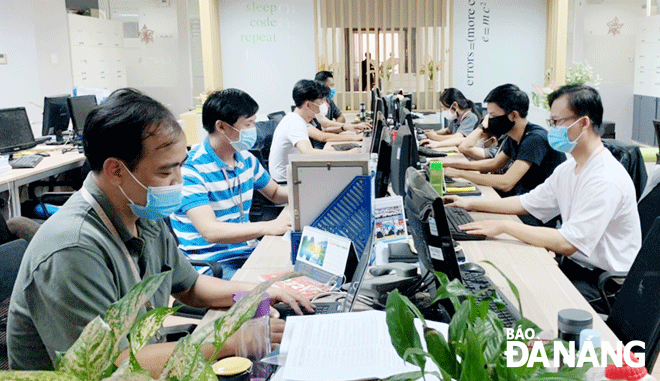Da Nang tries to secure top position in digital transformation at provincial and city levels
Da Nang has topped the Digital Transformation Index (DTI) rankings in 2020 at provincial and city levels in all three key pillars of digital government, digital economy and digital society.
 |
| Da Nang is making efforts to attract more digital technology experts and high-quality IT human resources to work in the city, thereby boosting digital transformation in the city. IN PHOTO: IT engineers are seen working at the Unitech Technology JSC based in Hai Chau District. Photo: SU HUY |
Numerous digital transformation products put into used
With a DTI of 0.4874 points, Da Nang is the leading locality in the rankings in all three pillars of digital government (0.5346 points), digital economy (0.4155 points), and digital society (0.4964 points).
This positive result accurately reflects the city's capacity by taking lead in Viet Nam on the readiness for information and communication technology (ICT) Index and the development of e-Government for many consecutive years.
In reality, many ‘Made-in-Da Nang’ digital transformation products have been put into use in the city. Included are digital data in replacement for paper documents (household and business registration certificates, etc.), online public services, COVID-19 epidemiological map, QR code entry cards, and Danang Smart City app.
Deputy Director of the municipal Department of Information and Communications Tran Ngoc Thach said that, in terms of digital government, Da Nang has built a synchronous IT and telecommunications infrastructure, as well as has formed background databases such as citizens, enterprises, household registration, land, officials and civil servants, and 560 specialized databases.
In addition, database system and specialised State management software has been deployed in the city, whilst the city’s Open Data Portal - a highly practical platform for publicising specialised and open data - has been put into use in order to serve the demands of organisations and individuals citywide via web forms, Application Programming Interface (API), SMS, and Zalo).
Da Nang has also upgraded its own e-government platform, and completed the Local Government Service Platform (LGSP), which connects with the National Government Service Platform (NGSP) for sharing data with ministries and central agencies, with 41 groups of API services, more than 20 million transactions via LGSP.
Besides, the city has successfully applied electronic one-stop software, document management and operating software with 100% of e-documents signed by digital signature, and online public services portal, of which 86% are online services at level 4.
Also, 36 out of the 37 components of Smart City Platform have been put into use.
Most notably, a host of useful tech-apps have been used to support the city’s fight against COVID-19. Specifically-mentioned are new travel permits embedded with QR codes, QR code medical declarations, QR code market entry cards, COVID-19 epidemiological map, and automatic switchboard notifying close contact tracing.
In terms of digital economy, the city’s IT industry has an average annual growth rate of 20%, contributing 7.5% to the city's gross regional domestic product (GRDP) growth.
Currently, Da Nang has an average of 2 digital technology enterprises per 1,000 people, ranked second after Ho Chi Minh City. A combined total of more than 40,000 people are working for the city's total IT industry.
From the perspective of digital society, the city takes lead in the percentage of mobile phone subscribers in the country, with 276 mobile phones per 100 people. There are 173 mobile broadband devices per 100 people on average, nearly 2 social network accounts per person.
As for culture – tourism industries, the city has deployed an online accommodation management application to register and manage tourists staying in Da Nang, as well as the Danang FantasiCity chatbot automatically guiding visitors to search key information on attractions, things to do, events, accommodation, cuisine, Automatic Teller Machines (ATM), public rest-stops, necessary hotlines, weather forecasts, and other Good-to-know information.
The Da Nang Cultural Heritage Map at https://bandodisandanang.vn facilitates both locals and visitors to access the latest updates and stunning images of historical sites and scenic spots across the city.
Most recently, the municipal Department of Tourism has launched the "A Virtual Vacation in Da Nang" VR360 application to provide virtual tours for visitors to discover many famous attractions in Da Nang.
Strategic approach, development orientations
Most recently, Da Nang has launched a project on boosting digital transformation in Da Nang to 2025, with a vision to 2030. Under the project, 67 specific goals and targets for digital transformation, along with 130 prioritized tasks and solutions, have been identified to promote the digital transformation in the city.
Deputy Director Thach highlighted the vital role of businesses and people in executing digital transformation.
He also underlined the need for the city to perfect mechanisms and policies, restructure, simplify administrative procedures, and innovate operating models in combination with the application of digital technology and digital data to further drive the city’s socio-economic progress.
Mr Thach proposed that more digital transformation support policies should be issued for enterprises, especially small and medium-sized ones, whilst digital infrastructure, digital data and digital technology platforms for digital transformation should be improved in the coming time.
Heed will be paid to training digital human resources and attracting more digital technology experts and high-quality IT human resources to work in the city.
Mr. Tran Ngoc Thach also suggested that the city should focus on developing digital technology businesses, mastering core technologies, and developing digital platforms and "make in Da Nang" products, thereby becoming the leading force to support other businesses in digital transformation.
Greater efforts should be made to develop a sharing economy and digital ecosystem in order to provide essential, intelligent and easy-to-use digital products and services for people, thereby fostering the forming of "digital citizens".
Reporting by THU HA - Translating by M.DUNG